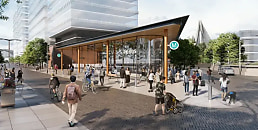In this exclusive RPM roundtable discussion, industry heavyweights compare notes on their day-to-day business practices, from listings presentations to management structures.
Kate Towerton uses flexible work arrangements within her team, Justin Spencer operates comfortably within a pod structure and Daniel Bligh gets a steady flow of leads from his business networking group.
Is it acceptable to use smartphones for listing photos? Should staff be allowed to work from home? How far away from the office can an agency have a property under management? These are some of the issues covered in this fascinating roundtable discussion.
The three property management professionals also share details on their day-to-day business practices and lead-generation strategies.
How big is your business?
Justin Spencer, LJ Hooker Parramatta
I work for the Sayhouns; it is a family business and we have just under 2,000 managements. We are in a pod structure and there are two of us that run the pod with a shared assistant from another pod. At the moment I have 520 properties in my pod.
Daniel Bligh, Elevate Property Group
I am on the other end of the scale; I am just short of 100. It is myself, a couple of casual staff and a business partner. We are 90 per cent property management, and that is the focus for us.
Kate Towerton, Belle Property Mosman
We have got around 455 managements and about 38 people in the company, so a pretty big sales team, operations team, and marketing team for the marketplace we are in.
Daniel Bligh, Elevate Property Group
I play a BDM role and a management role. My time is a bit all over the place, but that is part of the enjoyment. I really like the variety of my particular role.
Did you come from another PM business before?
Daniel Bligh, Elevate Property Group
I came from a sales background, and before that a property management/leasing-type background. It was great to have that experience behind me before I started a business.
Kate Towerton, Belle Property Mosman
In the business I was in before, we started at 20 managements and I kind of did exactly what you are doing. I owned part of the business and grew it. That first 100-150 you really are splitting your time between management, growing the business, being the leasing specialist, the trust accountant, everything that needs to be done.
Are you doing BNI (Business Network International)?
Daniel Bligh, Elevate Property Group
Yes. BNI is a networking group. Basically, it is a group of people that meet every week to talk about their businesses and referrals for their businesses. It is a variety of industries that get together and you have got exclusivity in your seat; so you have got one property manager, one sales agent, one conveyancer, one electrician, one plumber. It has been a really good source of business for me. I have been doing it for 18 months in the city. Most of the successful chapters that I have come across have been in the city. The size of the chapter is important as well. We have 52 members, plus visitors every week. The more you go, the more you show your face, the more committed you are, the more referrals you get because people build that trust.
What sort of listing numbers have you got over that 18-month period?
Daniel Bligh, Elevate Property Group
Probably almost 30 per cent of my business is from this networking group.
So for me, networking, meeting new people, giving and receiving referrals is a big part of the business. I hadn’t heard of it before I started my own business, and I Googled ‘networking in Sydney’ and then found this chapter and I thought, ‘OK, this makes sense, why don’t more people do it?’ But it is a big commitment – early mornings, so 6am starts with the meeting starting at 7am usually.
It is very structured and disciplined and accountable as well. They don’t just accept anyone in the chapter, you have to actually go through an interview process. You can rock up as a visitor, but to be a member you have to pay fees, pay all sorts of costs associated with it. I would highly recommend it.
What are your standards for listing photography? Is it acceptable to take photos with a smartphone?
Kate Towerton, Belle Property Mosman
I think not. Previously in the marketplace I used professional photos probably 95 per cent of the time, and where I am now, Belle is pretty strict on their marketing guidelines, so it would be picked up pretty quickly if it went the other way. Sometimes it is not possible straightaway; if you’ve got an urgent re-let and you don’t have marketing available straightaway.
But sometimes it is about giving the advice to hold off, because I think professional marketing is more of a given in the lower North Shore marketplace [of Sydney]. In saying that, there are still some agencies that do some really bad marketing out there.
Do you have much resistance from landlords about paying for professional photography?
Kate Towerton, Belle Property Mosman
I don’t and that is probably one of the big differences I have noticed between the two marketplaces that I’ve worked in. I very rarely have resistance on the marketing side of things. I think photos are going to last four or five years, so they see it as more of an investment.
Justin Spencer, LJ Hooker Parramatta
We have heaps of resistance. It is rare that we will get professional photos unless it has gone through the sales process and have already got them, or it is a higher-end property.
Most of our $400 a week, two-bedroom units can’t justify the $175 or $200 for photos. We do what we can. We have got wide angles and follow a process in the office to at least get it to a decent standard. I think you should never use an iPhone.
Do any of your offices have staff on flexible working arrangements?
Justin Spencer, LJ Hooker Parramatta
Not particularly. We have only got a couple of people that have access to emails and phones, which is department head, BDM, and then senior management. I know for myself, we don’t even get emails or phone calls to mobiles; it all just runs through our desk. It is a very young team though; I’m 25 and probably one of the oldest. Every Monday I leave at 4:30pm to play Oz tag, and my boss is like, ‘No drama, just go’.
So they’re pretty flexible like that. But in terms of flexible hours or working from home, no one really does it. I came from another business where we were based in the city and we had a senior who could work from home if she wanted to and the director would do the same, so you wouldn’t see them for a couple of days at a time. But in this business you see everyone every day.
How has that been? Does it strengthen the team?
Justin Spencer, LJ Hooker Parramatta
It is good for culture to see everyone there, so if anyone has any questions or someone gets stuck, you have another 15 people around the room that you can ask.
Daniel Bligh, Elevate Property Group
I have casual staff and I pay them per open.
Kate Towerton, Belle Property Mosman
A lot of people travel to get to our office, so we are working with that. I head up the department and have actually started changing my hours and starting a bit later because then the traffic is not so intense. We have got two team members that work from 7:30am to 4:30pm, just to switch it around.
For the senior property manager that approached us about doing 7:30am to 4:30pm, she is still expected to be able to take calls on her trip home between 4:30pm and 5:30pm for anything urgent. Basically they are coming from quite far away and it can just completely change the shape of the whole day depending on how long it takes them to get to work.
We are kind of in the trial phase at the moment. We have got a trust accountant that works 20 hours a week because there is just not the need for a full-time trust accountant. I guess the question came up as part of the recruitment process because there are return-to-work-type property managers who are wanting the two or three days of business hours. The consensus around the business was that there was some job sharing that hadn’t worked in the past.
Justin Spencer, LJ Hooker Parramatta
It comes down to the structure too. If I am not in the office then it will go to my PM, if it is urgent. I know that this morning, when I get into the office, I shouldn’t have any voicemails because he will have checked them, and then I will have a rundown of ‘You need to do this, this and this’ and that’s it. It is the same for him. He was off on Monday and he comes back to a couple of emails where I said, ‘Sorry, I do not know enough about it, so I didn’t do it’. Instead of spending the whole day catching up, we spend an hour or two hours in the morning catching up on a whole day’s worth of work and then you’re back into it.
How far away from the office can you have a property under management?
Kate Towerton, Belle Property Mosman
I have a different opinion on that in different marketplaces. Out in the Hills [north-west Sydney], how far you can travel from there in the space of 45 minutes to an hour is very, very different from how far you can travel from Mosman or Neutral Bay [North Shore] at different times of the day. Say at school time, from one end of Mosman to the other could take the best part of 45 minutes and essentially it is only 10 kilometres. For me, going to an important open home, you need to leave a 15-minute buffer for traffic and parking as well. Our leasing specialist really needs to build in a buffer for open homes on a Saturday compared to different marketplaces where there is just not that congestion or traffic. We cover the lower North Shore, we do some inner-city properties and some upper North Shore. We would refer it to another office if it was outside those boundaries.
What if an existing landlord had an investment in Mosman and a second property in the eastern suburbs at Bondi Beach?
Kate Towerton, Belle Property Mosman
Bondi Beach is probably the outer limit. We have a few that we do in Paddington [inner city] at the moment for existing landlords where we manage their local properties and a couple in the Inner West. It does come down to the return on investment and who you’ve got to actually take care of that. I have had a property manager want to take on a few out-of-area things, which is fine if it is under management, but then if it needs to be leased and it isn’t leased from that first or second open home then that is going to throw your leasing specialist out for a whole day.
On the lower North Shore, the difference I have seen is that mid-week inspections during the day are quite effective. We just didn’t see that in the marketplace that I was in before; it was weekends and 5:30pm onwards. Having that flexibility in the inner-city areas means that you can take on things a little bit further away if you can show them during those times.
Justin Spencer, LJ Hooker Parramatta
We are similar to what you were. If it is a one-off landlord, we won’t take it on out of area; but if it is multiple, we will. We also have a few landlords that have a couple scattered across Sydney metro. We have got one that has a couple in Parramatta and one in Redfern, so we will take that one in Redfern. But same thing; if you don’t lease it that first time, getting there and back starts to get very tedious.
Should PMs do listings presentations? Or should it be left purely to BDMs?
Kate Towerton, Belle Property Mosman
I strongly believe in the BDM as that sales-focused person, as that proactive hunter-gatherer-type of personality, and the PM is more that process-driven person. I think it comes down to your economies of scale and some businesses don’t always have the luxury of having two people focused on two different things. A BDM is an investment in your business, they are an additional cost when you do put them on, so you have to get to a certain point before you can invest in that. When I owned part of the business I was in before I was managing and growing and I had a vested interest, but trying to get a PM that has got to react to storms or maintenance and then switch over in the second part of their day and pick up the phones and do prospecting – even as head of department I sometimes find it quite hard to make that quick transition to reactive from proactive.








You are not authorised to post comments.
Comments will undergo moderation before they get published.